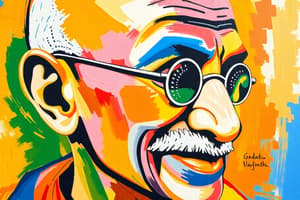Podcast
Questions and Answers
Why is Gandhi considered one of the most influential people of the twentieth century?
Why is Gandhi considered one of the most influential people of the twentieth century?
He inspired other leaders to be non-violent.
Why did Gandhi encourage Indians to weave their own cloth?
Why did Gandhi encourage Indians to weave their own cloth?
Textiles were a major source of income for Britain.
What was the refugee crisis that occurred in India after its partition a result of?
What was the refugee crisis that occurred in India after its partition a result of?
Too many people trying to relocate at one time.
What was the Salt March in protest of?
What was the Salt March in protest of?
Which of the following occurred as a result of India's partition in 1947? (Select all that apply)
Which of the following occurred as a result of India's partition in 1947? (Select all that apply)
Which of the following is the best example of civil disobedience?
Which of the following is the best example of civil disobedience?
Who made the following statement regarding the partitioning of India: 'Those who demand separation would, in the end, suffer most for it...'?
Who made the following statement regarding the partitioning of India: 'Those who demand separation would, in the end, suffer most for it...'?
During World War II, the Indian National Congress told citizens to?
During World War II, the Indian National Congress told citizens to?
Flashcards are hidden until you start studying
Study Notes
Gandhi's Influence
- Gandhi is regarded as a pivotal figure of the twentieth century due to his advocacy for non-violence, which inspired global leaders and movements.
Economic Independence
- Encouraged Indians to weave their own cloth as a form of self-reliance to combat British economic dominance, particularly in textiles, a major revenue source for Britain.
Partition Refugee Crisis
- The refugee crisis following India's partition resulted from a sudden mass relocation of people, leading to significant social turmoil and hardships.
The Salt March
- The Salt March was a form of protest against British regulation that mandated Indians purchase salt solely from government sources, symbolizing resistance to colonial authority.
Consequences of Partition
- India's partition in 1947 led to severe repercussions, including widespread rioting among communities and the assassination of Gandhi, reflecting the intense communal tensions of the time.
Civil Disobedience
- A prime example of civil disobedience is the refusal to pay taxes based on disapproval of government spending, highlighting non-violent resistance to unjust laws.
Nehru's Statement
- Jawaharlal Nehru remarked on the partition, indicating that those advocating for separation would ultimately face greater suffering, underscoring the complex implications of division.
National Congress's Stance During WWII
- The Indian National Congress urged citizens to abstain from voting in elections during World War II as part of its broader strategy to challenge British rule and demonstrate political discontent.
Studying That Suits You
Use AI to generate personalized quizzes and flashcards to suit your learning preferences.




